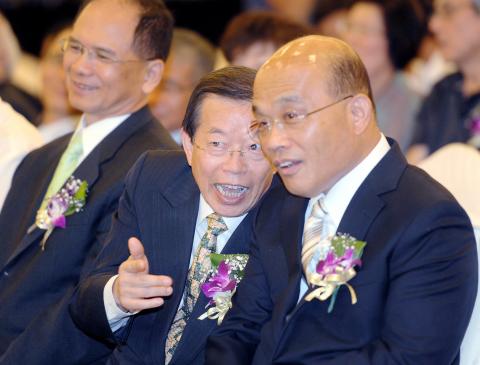Former premier Frank Hsieh (謝長廷) said yesterday that he has accepted an invitation from the International Bartenders Association to visit Beijing next month to watch a world bartending competition there.
Hsieh, an influential member of the Democratic Progressive Party (DPP), said he has informed the association that he is willing to go if the required procedures, including flight and hotel arrangements, can be completed without any glitches.
Saying that “October is a sensitive month” since it is close to when the Chinese Communist Party’s 18th National Congress — in which a leadership changeover is expected — is scheduled to take place, Hsieh added that “for a person like me now may not be the best time to visit. Maybe it will be too much trouble.”

Photo: Lo Pei-der, Taipei Times
Citing the peak travel season of China’s Golden Week holiday, which begins around Oct. 1, Hsieh added there is also the question of flight and hotel availability. The matter is to become more certain in two or three days, he said in response to media inquiries at a tea party held by the DPP celebrating its 26th founding anniversary.
If Hsieh makes the trip, he would be the first former DPP premier to visit China.
Hsieh, who served as premier between May 2005 and January 2006 in former president Chen Shui-bian’s (陳水扁) administration, has long been a devoted supporter of the Kaohsiung-based Bartenders Association. He once traveled to Germany for an international bartending contest to show his support for the Taiwanese competitors.
However, Hsieh’s possible China trip has drawn mixed reactions from his party.
Koo Kwang-ming (辜寬敏), a former presidential adviser and a veteran Taiwan independence advocate, backed the trip, saying Hsieh should have made the trip a long time ago “because China is a very important rival.”
Former DPP Taipei Chapter chairman Huang Ching-lin (黃慶林) said “it is OK to be on friendly terms with China, but not to pay ‘tribute’ at this sensitive moment.”
Former DPP chairman Yao Chia-wen (姚嘉文) also voiced his opposition to the planned visit. As Hsieh had once broached the notion of “constitutional one China (憲法一中),” Yao said he felt uneasy about Hsieh visiting Beijing.
The essence of Hsieh’s concept of “constitutional one China” purported that until the Republic of China (ROC) Constitution is amended, the DPP must acknowledge the ROC Constitution, although it is seriously flawed.
At the DPP anniversary party, Yu Shyi-kun (游錫堃), who also once served as premier during the former DPP administration, said that while he supports increased interaction with China, the party should uphold its core values and should never abandon them simply for improving ties with Beijing.
According to DPP spokesperson Wang Ming-sheng (王閔生), the party has no particular restriction on party members planning trips to China, adding that party regulations stipulate only that members need to give prior notification to party headquarters on their planned China trips.

AGING: As of last month, people aged 65 or older accounted for 20.06 percent of the total population and the number of couples who got married fell by 18,685 from 2024 Taiwan has surpassed South Korea as the country least willing to have children, with an annual crude birthrate of 4.62 per 1,000 people, Ministry of the Interior data showed yesterday. The nation was previously ranked the second-lowest country in terms of total fertility rate, or the average number of children a woman has in her lifetime. However, South Korea’s fertility rate began to recover from 2023, with total fertility rate rising from 0.72 and estimated to reach 0.82 to 0.85 by last year, and the crude birthrate projected at 6.7 per 1,000 people. Japan’s crude birthrate was projected to fall below six,

US President Donald Trump in an interview with the New York Times published on Thursday said that “it’s up to” Chinese President Xi Jinping (習近平) what China does on Taiwan, but that he would be “very unhappy” with a change in the “status quo.” “He [Xi] considers it to be a part of China, and that’s up to him what he’s going to be doing, but I’ve expressed to him that I would be very unhappy if he did that, and I don’t think he’ll do that. I hope he doesn’t do that,” Trump said. Trump made the comments in the context

SELF-DEFENSE: Tokyo has accelerated its spending goal and its defense minister said the nation needs to discuss whether it should develop nuclear-powered submarines China is ramping up objections to what it sees as Japan’s desire to acquire nuclear weapons, despite Tokyo’s longstanding renunciation of such arms, deepening another fissure in the two neighbors’ increasingly tense ties. In what appears to be a concerted effort, China’s foreign and defense ministries issued statements on Thursday condemning alleged remilitarism efforts by Tokyo. The remarks came as two of the country’s top think tanks jointly issued a 29-page report framing actions by “right-wing forces” in Japan as posing a “serious threat” to world peace. While that report did not define “right-wing forces,” the Chinese Ministry of Foreign Affairs was

PREPAREDNESS: Given the difficulty of importing ammunition during wartime, the Ministry of National Defense said it would prioritize ‘coproduction’ partnerships A newly formed unit of the Marine Corps tasked with land-based security operations has recently replaced its aging, domestically produced rifles with more advanced, US-made M4A1 rifles, a source said yesterday. The unnamed source familiar with the matter said the First Security Battalion of the Marine Corps’ Air Defense and Base Guard Group has replaced its older T65K2 rifles, which have been in service since the late 1980s, with the newly received M4A1s. The source did not say exactly when the upgrade took place or how many M4A1s were issued to the battalion. The confirmation came after Chinese-language media reported